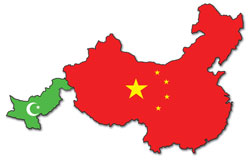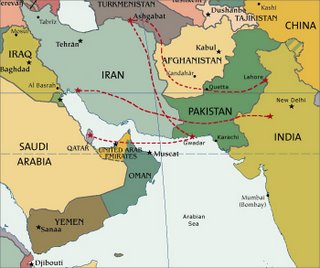
Pakistan-China relationship versus the emerging Indo-US strategic partnership.
China is today actively engaged in using its relationship with Pakistan to enhance its influence in the Persian Gulf as well as Central Asia.

Inland, the two countries have agreed to extend the Karakoram Highway (KKH), to connect it with the Central Asian republics.
On the Balochistan coast, China is engaged in building up the Gwadar port, the overbearing strategic importance of which has been ignored even as analysts focus on the project’s economic importance.
The arrangement on Gwadar allows China to sit atop one of the world’s most important SLOCs, the acronym used by strategic analysts for ‘sea-lanes of communication’.

Being at Gwadar means China will only be 250 miles from the Strait of Hormuz, a key channel for the flow of world oil supplies and other commercial merchandise.
Moreover, Beijing will gain direct access to the Persian Gulf.
In the final outcome, the KKH extension and Gwadar port construction allow China to diversify its oil-import routes, as well as make its presence felt in both the Persian Gulf and Central Asia.
Pakistan plans to treat Gwadar as a ‘sensitive defence area’, and has made clear its intention of using the Chinese navy as a ‘forward defence’ against any maritime hostility.

The most direct impact of the Gwadar port will be on the United States.
Moreover, its maritime cooperation with India in the Arabian Sea was developed to achieve exactly what Pakistan and China are attempting through Gwadar – ie, to enhance their sphere of influence to oversee the shipping activity and the ‘great game’ of oil flows from the Gulf.
It is clear that Washington DC is not happy with the Gwadar arrangement, and internal Pentagon memos point to the Chinese presence as a worrisome factor.
Some reports even indicate a US hand in the troubles in Balochistan, linked to Washington DC’s opposition to both the port project and proposed oil and gas pipelines from Iran.

Pakistan has indicated that it is prepared to be at the centre of an energy grid that extends to China.
There are already significant moves by India and the US acting in concert to help develop alternate port facilities in the Gulf in order to divert traffic from Gwadar.
The US is desperate to undermine Gwadar and all that this port project represents. There is a suggestion that the US might use India to lead the initiative to revitalise the Iranian facilities while turning a blind eye to the development.
China will continue to build stronger ties with Pakistan, and from time to time it will signal to New Delhi and Washington DC the importance it places on its relationship with Islamabad.

Islamabad should expect significant moves from the opposing camp to undermine its arrangement with Beijing. Targeting Pakistan’s internal fault-lines would be one way of doing that. Involvement in the Balochistan crisis could serve this interest, and the lingering Waziristan conflict could also be used to keep Pakistan unstable.
For Pakistan, internal stability comes above all else. For one, peace in Balochistan is essential for the progress on the Gwadar front.
No comments:
Post a Comment